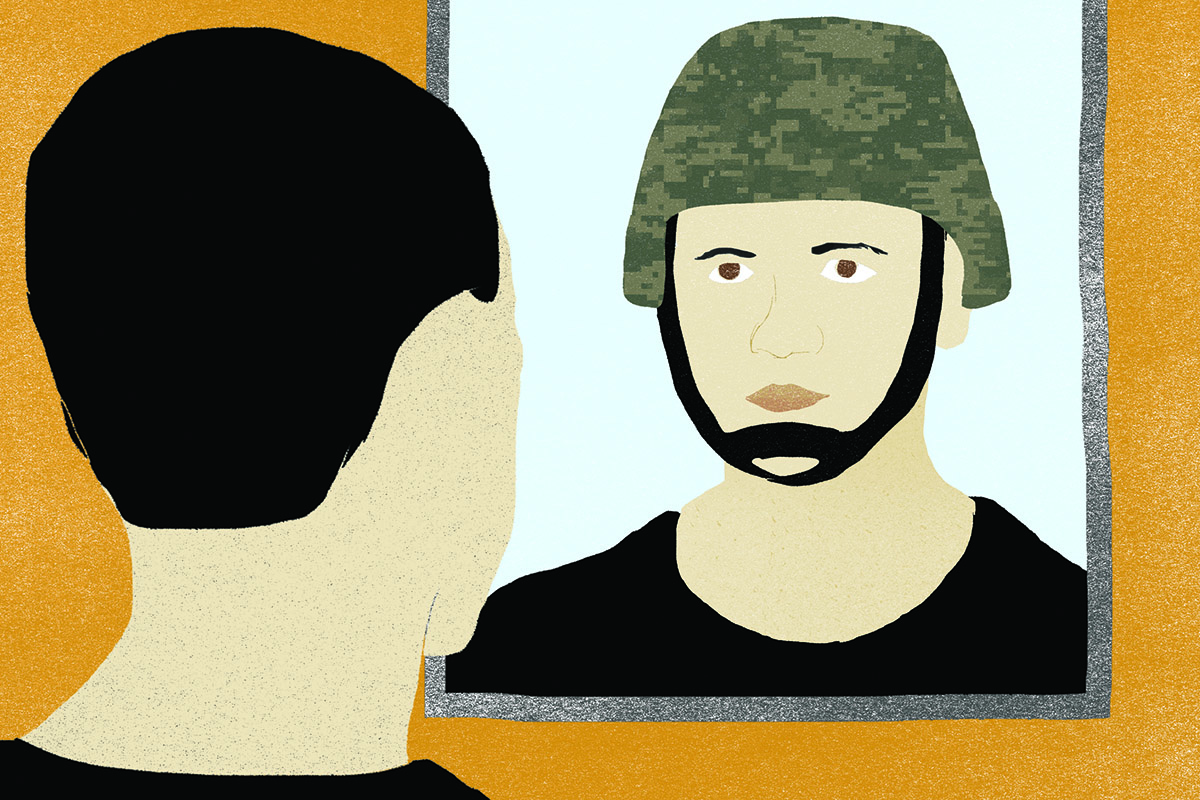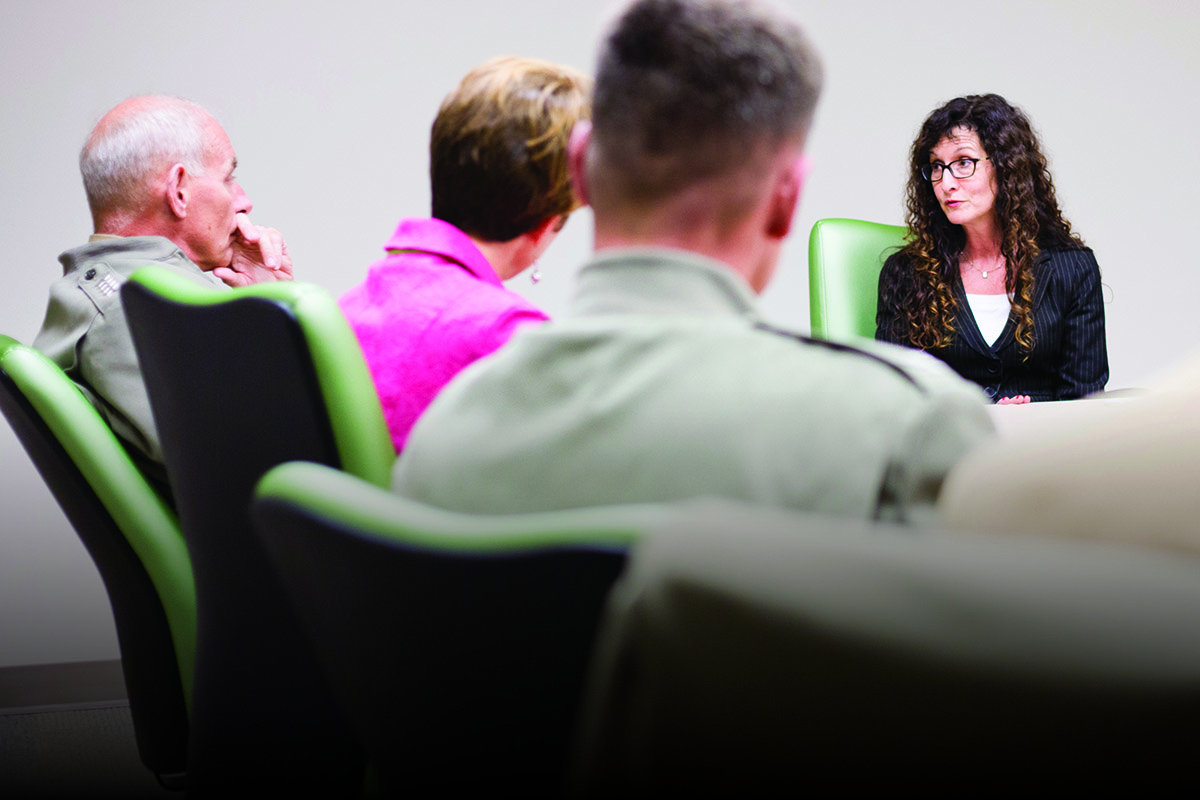When the war isn't over
Emory programs help veterans on the home front

By Maria M. Lameiras
One morning in March of this year, Matt Barnes was on the porch of his home on a rural 10-acre parcel of land near Cartersville, Georgia, cutting lumber for a remodeling project. In the distance, he could hear gunfire—not unusual for that area due to hunting and recreational shooting. But on this particular day, the gunshots continued, unrelenting, throughout the day.
That month marked 11 years since Barnes was discharged from the US Marines, and more than a dozen since he stepped on the airplane that would bring him home after nearly a year on the front lines of the war in Iraq. Yet each rifle crack that day brought the memories closer.
“My anxiety just started getting higher and higher," says Barnes, who finally took a break for dinner with his wife, Crystal, and his mother-in-law. "When we came back, I was fine. I went back out on the porch cutting wood, and shots start getting fired again. I don’t remember anything after that."
Some time later the women noticed he was gone from the porch and began to search for him.
“Crystal and her mom found me in the barn. I had kicked the door in, I had my .45, and I was clearing rooms,” Barnes says, referring to the military close-quarters combat practice of checking the interior rooms of buildings for threats. “I don’t remember any of it. The first thing I remember after being on the porch was her mom touching me on the shoulder and saying, ‘Matt, give me the gun.’ ”
Though he had suffered symptoms of posttraumatic stress disorder (PTSD) since before leaving Iraq and had been discharged from the marines for drug use little more than a year after returning from overseas, Barnes had never sought treatment. During years of nightmares and unpredictable mood swings; substance abuse; violent arguments with two ex-spouses; and avoidance of social situations, friends, and family, he chalked it all up to stress and bad relationships.
“I didn’t think I had an issue, I just thought I was an asshole,” Barnes says candidly.
After the incident in the barn, Barnes’s family encouraged him to seek help for what they were sure was PTSD, but he wasn’t sure where to go. On a visit to the Wounded Warrior Project’s website a few days later, Barnes saw a link for the Warrior Care Network, an initiative launched in June 2015 to meet the needs of thousands of post–9/11 veterans suffering from PTSD and traumatic brain injury regardless of geographic location or ability to pay.
“It was by pure miracle I saw that link,” says Barnes, who applied to the program and was referred to the Emory Veterans Program (EVP), one of four national centers that are part of the Warrior Care Network.
Barbara Rothbaum, director of the Emory Veterans Program, has been treating people with PTSD since shortly after the condition became an official diagnosis recognized by the American Psychiatric Association in 1980. As professor of psychiatry and behavioral science at Emory School of Medicine and director of Emory’s Trauma and Anxiety Recovery Program, she has pioneered the application of virtual reality exposure therapy to the treatment of such disorders since joining the Emory faculty in 1990.
Her work and Emory’s innovative programs in treating PTSD led to Emory’s selection for the Warrior Care Network, and the EVP opened its doors in September 2015. In February, they began piloting a two-week intensive outpatient program that asks patients to commit to an exhaustive schedule addressing their psychological and physical health, and helping them build coping and relationship skills to handle stressful situations at home and in the world.

Barbara Rothbaum is a national expert on PTSD therapies.
Ann Borden
During the two-week program, veterans from around the country stay at a nearby hotel and spend carefully scheduled days filled with therapy, education, family and relationship counseling, sleep disorder management, yoga, and other activities designed to help them regain control over their thoughts, emotions, and lives.
They also connect veterans to outside programs. Barnes is working with the Emory Law Volunteer Clinic for Veterans, which assists veterans with legal issues, including claims for service-connected disability and applications for discharge upgrade and record correction for those diagnosed with PTSD and traumatic brain injury.
More than 200 veterans have been served through the program since September, with about 27 participating in intensive outpatient treatment since February. Once they complete the program, Emory’s staff coordinates with a team in the vet’s home community to ensure proper follow-up care.
“Military folks are trained in avoidance, in emotional detachment and disengagement, and when you get into this treatment, they are asked to confront the things they most want to avoid,” Rothbaum says. “When you get into the hard parts, it takes a lot of courage, a lot of bravery to continue even when you are scared. We’ve seen difficult cases with patients I’m not sure would have made it through treatment if we only saw them one or two times a week.”
One hallmark of Emory’s program is two-part prolonged exposure therapy. The first, called imaginal exposure, requires the veteran to spend time with a therapist recalling, repeatedly and in exacting detail, their most traumatic experiences. Although it sounds agonizing, Rothbaum says this repeated exposure to the distressing memory is proven to reduce its traumatic effect. In the second part, called in vivo or “real life" therapy, veterans are taken out and exposed to environmental stressors they would otherwise avoid.
“Some of these veterans can’t even go to a store like a Wal-Mart without behaving as if they were pulling guard duty,” Rothbaum says. “When veterans undergo military training, they are taught to always be on a heightened state of alert, but no one untrains them. We want to change their brains, their bodies, and their memories in two weeks.”
Barnes started the outpatient program on April 18, still wary of whether he could benefit. That first day began with an orientation and meetings with doctors, counselors, and finally, prolonged exposure therapy with clinical psychologist Liza Zwiebach.
“You’ve got to sit there and recount this experience while they are probing you for details you’ve never told anybody,” Barnes says. “The first couple of times I ran through it, I was fine, it was just like muscle memory. By the fourth or fifth time I was in tears. I could barely get through it. I thought Liza was the devil for the first few days.”
Youthful and down-to-earth, Zwiebach is the antithesis of demonic, but she understands how difficult the task is that she sets before her patients, and how critical.
“Most veterans don’t have just one traumatic event they've experienced, but we identify one memory that is staying with them and that is what we focus on,” she says. “The idea is to wear out the memory.”
The daily 90-minute sessions are recorded and participants are required to take the recordings back to their rooms at night to listen to as “homework.”
“The patient tends to get a new perspective on the events when they work through the memory in a way they haven’t been able to before,” Zwiebach says. “Sometimes people with PTSD blame themselves for certain events and, through this process, they gain a new understanding of what happened.”
Another key component of the program is the employment of veteran outreach coordinators, all combat veterans themselves, which provides a sense of connection and level of comfort to program participants.
The leader of the outreach staff is retired US Army Command Sergeant Major Gretchen Evans, a 27-year Airborne Infantry veteran who saw combat in Grenada, Panama, Central America, Bosnia, Somalia, Iraq, and Afghanistan with the 82nd Airborne Division. In 2006, a close encounter with a rocket at a forward operating base in Afghanistan took away her hearing and her military career. After four years of bitterness and isolation, she sought treatment for her own PTSD and traumatic brain injury.
The opportunity to work with veterans has given Evans back her career-long purpose—taking care of soldiers.
“There are two things that can happen on the battlefield when a soldier is wounded; either they are captured by the enemy or they die on the battlefield. That is why we have the motto of no soldier left behind. It is the same when these veterans come home and they’ve got invisible wounds. They are still on that battlefield, and they are wounded. They will either die of those wounds—through substance abuse, alcohol, suicide—or they are captured by the enemy—an unhealthy lifestyle, addiction, homelessness,” Evans says.
“There are more than 2.5 million post–9/11 veterans. If we don’t take care of them now, in 20 years we are going to see people in uniform homeless under bridges, the heroes of the longest war in history with high unemployment rates, high substance-abuse rates, high suicide rates," Evans says. "Someone needs to help them. If not me, then who?”
One of Evans’s staff of veteran outreach coordinators is former US Navy corpsman Deramichaelous Daniels, known as DeeMike to his colleagues and patients of the program.
Daniels enlisted after 9/11 and grappled with his own PTSD after returning to the US, then to civilian life.
“There is no road map for how to be reinserted in civilian life,” says Daniels, who refers to himself as “the boots on the ground” for the program, answering telephone calls from veterans or concerned family members any time, day or night. During the program, he shares meals with the veterans, accompanies them on outings, and spends downtime with them on evenings and weekends when their time isn’t occupied and their minds wander.
“I can’t help with their mental health, but we can talk about life and they can open up and share experiences with me. If I reach one person, I might save a life. If I can do that, I’m good, I’ve made a difference.”
At a graduation ceremony held at the end of each program session, veterans receive an organizational coin designed by the staff—similar to challenge coins awarded in the military to prove membership—to signify their success.
For Barnes, the program gave him a chance to regain control of a life warped by the aftermath of his war experiences. Part of his motivation was the impending birth of his son, Nikalus, who was born July 15.
“My daughter, Abby, is almost 12, and she’s grown up seeing Daddy like this. I don’t want my son growing up seeing me like that. I want him to be a better man than I am,” Barnes says. “Going through the program is the best decision I’ve ever made.”







